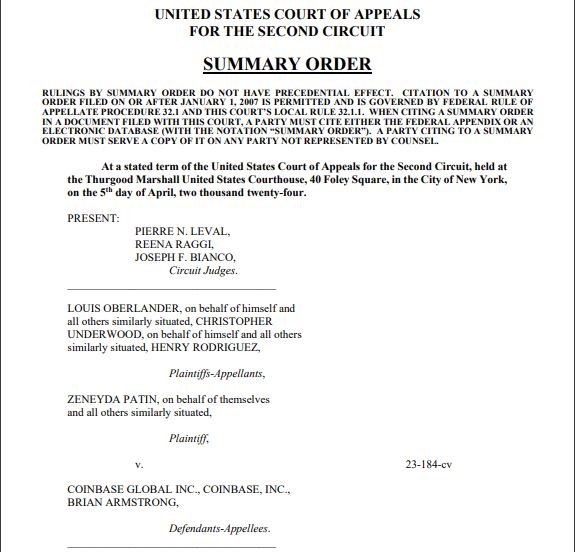A current courtroom determination in the USA has supplied a blended verdict for cryptocurrency regulation, with implications for each crypto exchanges like Coinbase and traders nationwide.
The US Court docket of Appeals for the Second Circuit dominated that secondary gross sales of cryptocurrencies on Coinbase don’t fall below the purview of the Securities Alternate Act of 1934.
This victory for the crypto change brings some aid to the crypto trade, however doesn’t remove all of the authorized uncertainties surrounding cryptocurrencies.

Coinbase Wins Attraction On Secondary Gross sales
The lawsuit centered on whether or not the cryptocurrencies traded on the change certified as securities. If categorized as securities, they’d be topic to stricter rules below the Securities and Alternate Fee (SEC).
A nationwide class of plaintiffs argued that Coinbase facilitated the unregistered sale and providing of securities via its platform, violating numerous rules below the Securities Act of 1933 and the Securities Alternate Act.
COINBASE WINS AGAINST THE SEC $COIN
“One of many high crypto exchanges, Coinbase, has achieved a serious victory in an ongoing authorized battle. The U.S. Court docket of Appeals for the Second Circuit dominated in favor of Coinbase, confirming that secondary gross sales of cryptocurrencies on its… pic.twitter.com/EIKs9r5KN9
— amit (@amitisinvesting) April 6, 2024
Coinbase, however, maintained that secondary crypto gross sales on their change didn’t meet the authorized definition of securities transactions.
The Court docket of Appeals’ determination offered some vindication for Coinbase. The courtroom agreed that secondary gross sales on the platform weren’t securities below the Securities Alternate Act.
It is a important win for Coinbase and crypto lovers who participated in secondary buying and selling on the platform between October 2019 and March 2022.
Unresolved Points Cloud The Verdict
Nevertheless, the courtroom’s determination wasn’t an entire victory for Coinbase. The courtroom partially upheld a decrease courtroom ruling suggesting that Coinbase might nonetheless be liable below Part 12(a)(1) of the Securities Act for promoting unregistered securities.
One other level of competition lies with Coinbase’s consumer agreements. The courtroom acknowledged the altering nature of those agreements, which made it tough to definitively assess their authorized implications. This ambiguity creates uncertainty for each traders and the change itself.
Lingering Debate And Want For Readability
The Court docket of Appeals’ determination highlights the continued debate about regulate cryptocurrency within the US. Whereas Coinbase interprets the decision as affirmation that secondary crypto gross sales aren’t securities, the plaintiffs see it as a stepping stone in direction of imposing securities legal guidelines on crypto platforms.
This distinction in perspective underscores the necessity for clear and complete rules to manipulate the cryptocurrency market.
Each Coinbase and trade specialists agree {that a} lack of readability in rules hinders innovation and progress within the crypto house. Paul Grewal, Coinbase’s Chief Authorized Officer, emphasised the necessity for clear rules in a current X put up.
He expressed hope that the courtroom’s determination would pave the best way for a constructive dialogue with regulators to ascertain a framework that fosters accountable innovation within the crypto trade.
The courtroom’s determination gives some readability on the classification of secondary crypto gross sales on Coinbase, however it doesn’t settle the broader problem of crypto regulation.
Featured picture from EveryPixel, chart from TradingView



